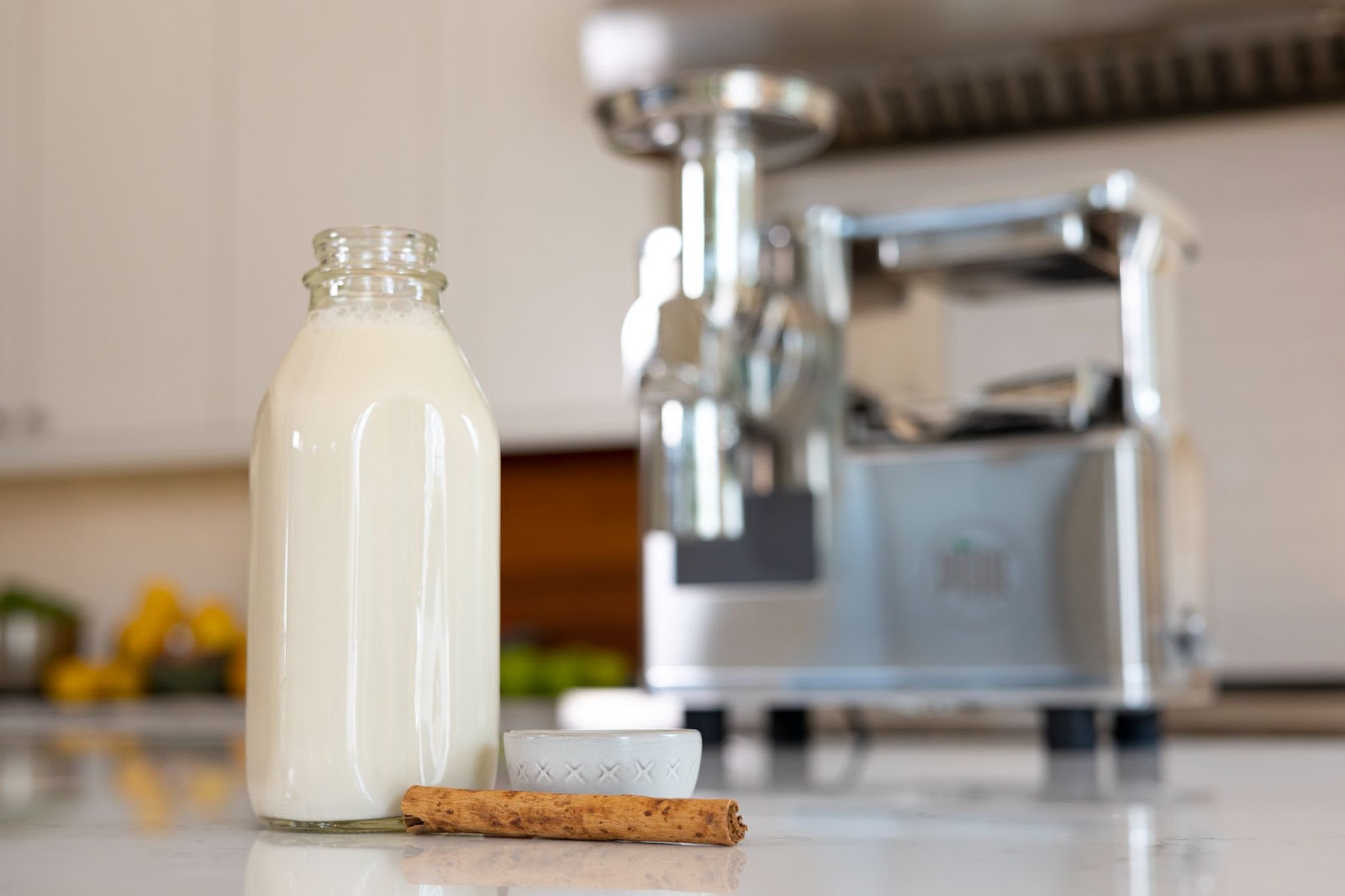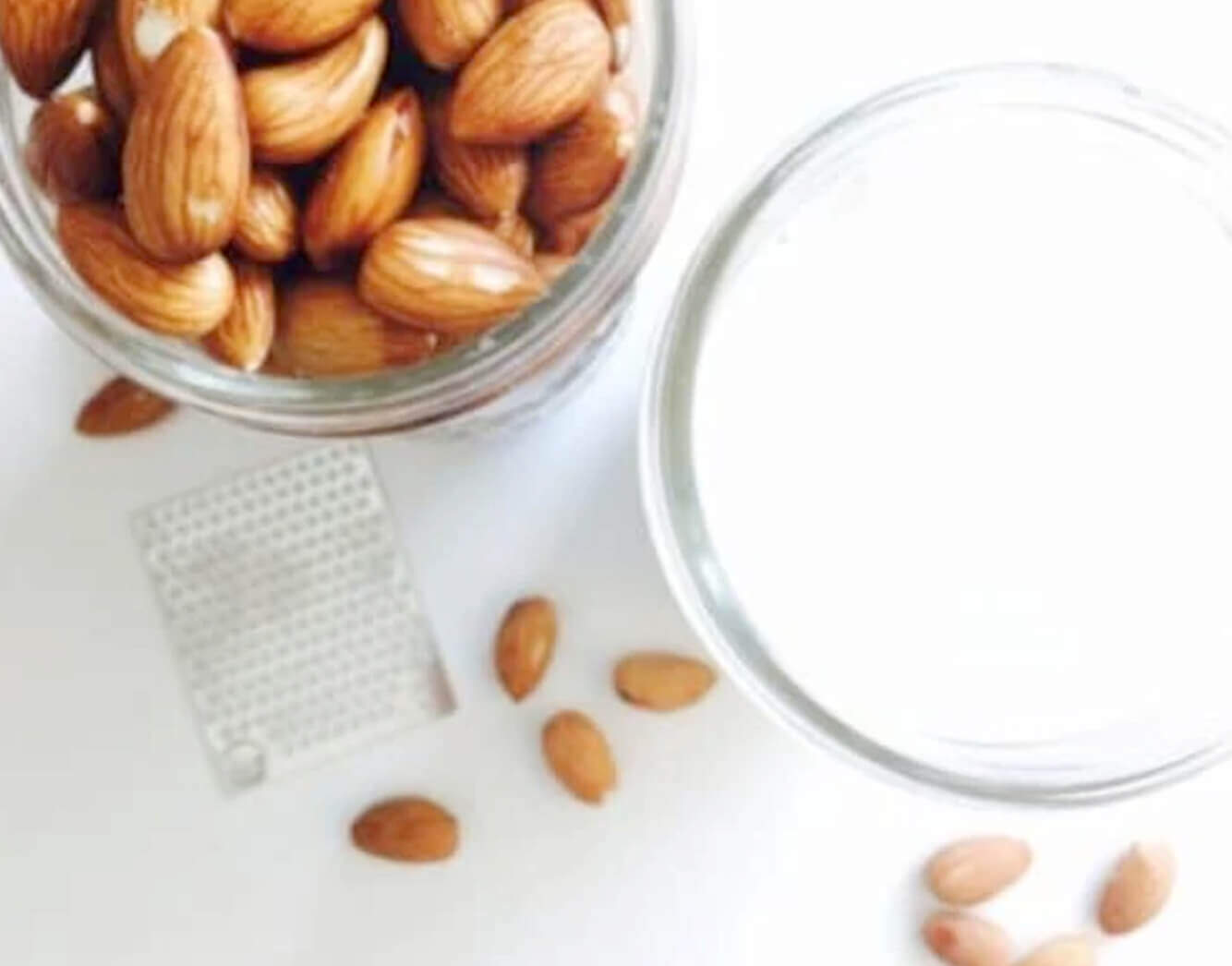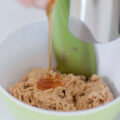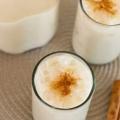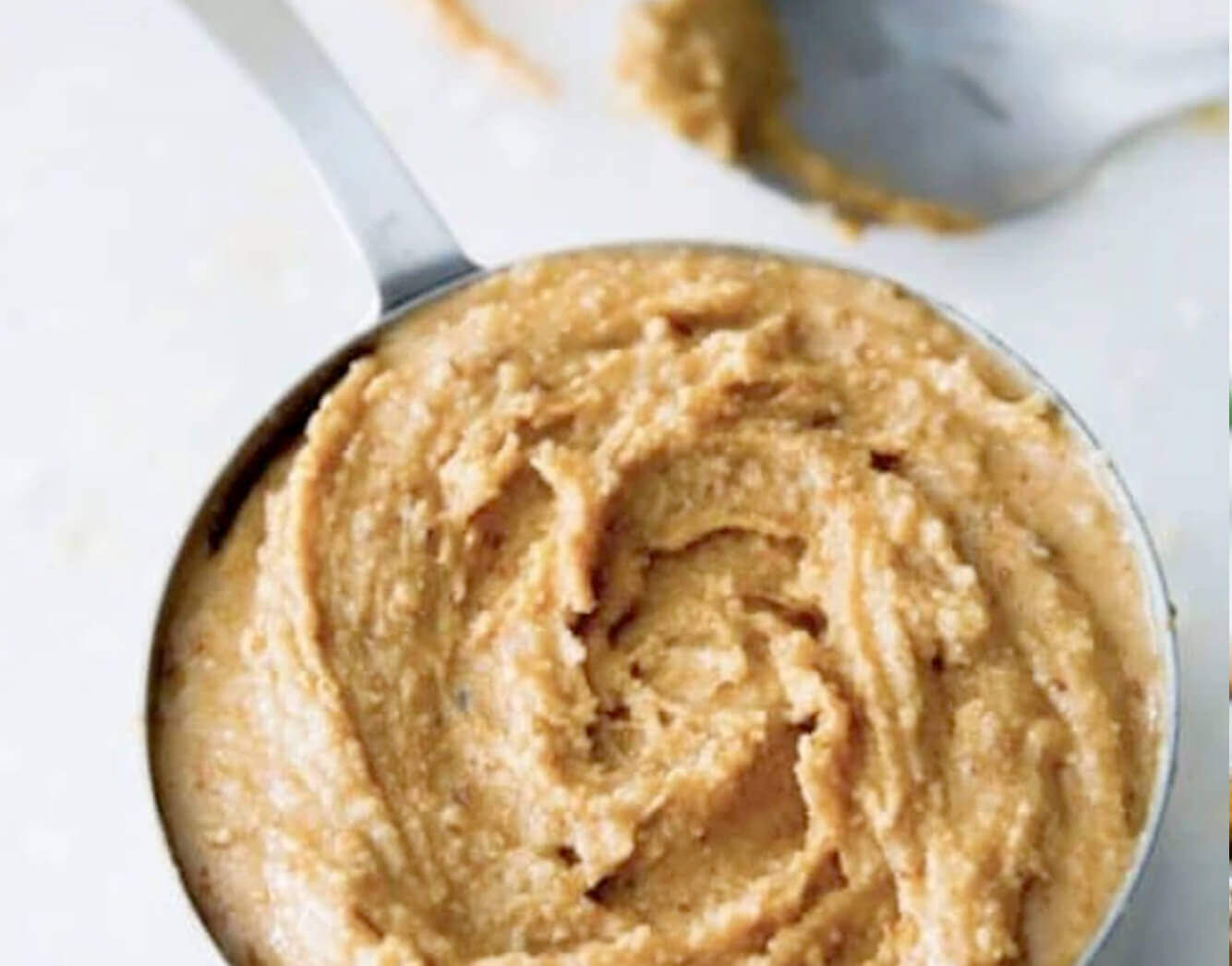Why Homemade Nut Milk?
If you’re looking for an alternative to dairy milk, there is a wide selection of plant-based options now available to us in most grocery stores. So why take the time to learn how to make homemade nut milk in your juicer?
Simply put, store-bought nut milk is often ultra-processed and contains added sugars. As with all raw, whole-food recipes, making your own nut milk is a healthy practice you can do with confidence, knowing exactly what you’re feeding your family (and yourself)!
Nut and Plant-Based Milks We Love to Make in the PURE Juicer
Almond Milk
One of the most versatile nut milks that we adore making in our test kitchen is our homemade almond milk. Delicious and low in calories, almond milk is wonderful on its own and in coffee, hot cocoa, or flavored with spices or fruit juice (more on that below).
Almond milk has a natural, light sweetness to it, thanks to the lovely taste of fresh raw almonds. If you’d like it (or any of these nut milks) a bit sweeter, closer to what you might buy at the store, you can add fresh dates and vanilla extract to the nut and water mix before turning on the blender or PURE grinder.
The pulp from this milk is different from cashews and other high-fat nuts. It is dry enough to use as flour. We know because we have tried it. It’s good. A little chewier than real flour, so you may want to mix the two.
Tiger Nut Milk
Tiger nut milk is rich in calcium, which promotes bone health and growth. We like to also remind our readers that this is not a nut. So it’s a great alternative for anyone looking for plant-based and nut-free options.
According to a study, tiger nuts are nutritionally better than other non-milk alternatives, scoring among the highest in terms of healthy fat content, protein, calcium, phosphorus, and oleic acid. And it is naturally sweet so if you don’t add dates or other sweeteners, you may not miss it. We don’t.
Learn how to make Tiger Nut Milk and Tiger Nut Cookies
Pistachio Milk
Pistachios are high in protein, which makes pistachio milk an especially great choice for vegans and vegetarians. These nuts also contain a high amount of B6, which aids in protein metabolism and cognitive development; in fact, a serving of pistachios can provide an adult with about 37% of their daily recommended vitamin B6 intake.
We are moving into a more ‘mushy’ nut, so as you press this pulp, keep the pressure lighter. Or even mix it with almonds.
Cashew Milk
Cashew milk tastes creamier than almond milk and is also low in calories. It foams for lattes, and is rich and satisfying. We like this mixed with other kinds of milk, especially oat milk, which is very light…we craved something richer in that milk.
Full of nutrients like magnesium, iron, phosphorus, potassium, and zinc, cashews are a good source of protein and contain fat that is mostly unsaturated.
Oat Milk
Oat milk is all the rage, but if you look at the ingredients in the options at the store, you will wonder if it’s the oats that are so good or all the additives. Oat milk that is homemade is light, slightly sweet, and very easy to drink. Although we craved something to make this milk richer (like almonds or cashews), we will make it again on its own.
The benefits of oats go beyond their antioxidant properties. They are considered easy on the planet. Easy to grow. The process of juicing them is similar to nuts (we prefer 1 part oats to 3 parts water) and everything is used. We even sprinkle dried pulp into the oatmeal we eat on occasional mornings.
Coconut Milk
We know coconuts aren’t actually nuts. But we’re including them here because coconut milk is one of the most popular milk alternatives.
Creamy and smooth, coconut milk has a distinct taste that can be a wonderful replacement for dairy milk. Because the biological profile of coconuts differs greatly from peanuts and other tree nuts, if you have a nut allergy, coconut milk may be the best choice for you (make sure to speak to your doctor to confirm).
Coconut milk has been shown to reduce inflammation, decrease ulcer size and fight viruses and bacteria.
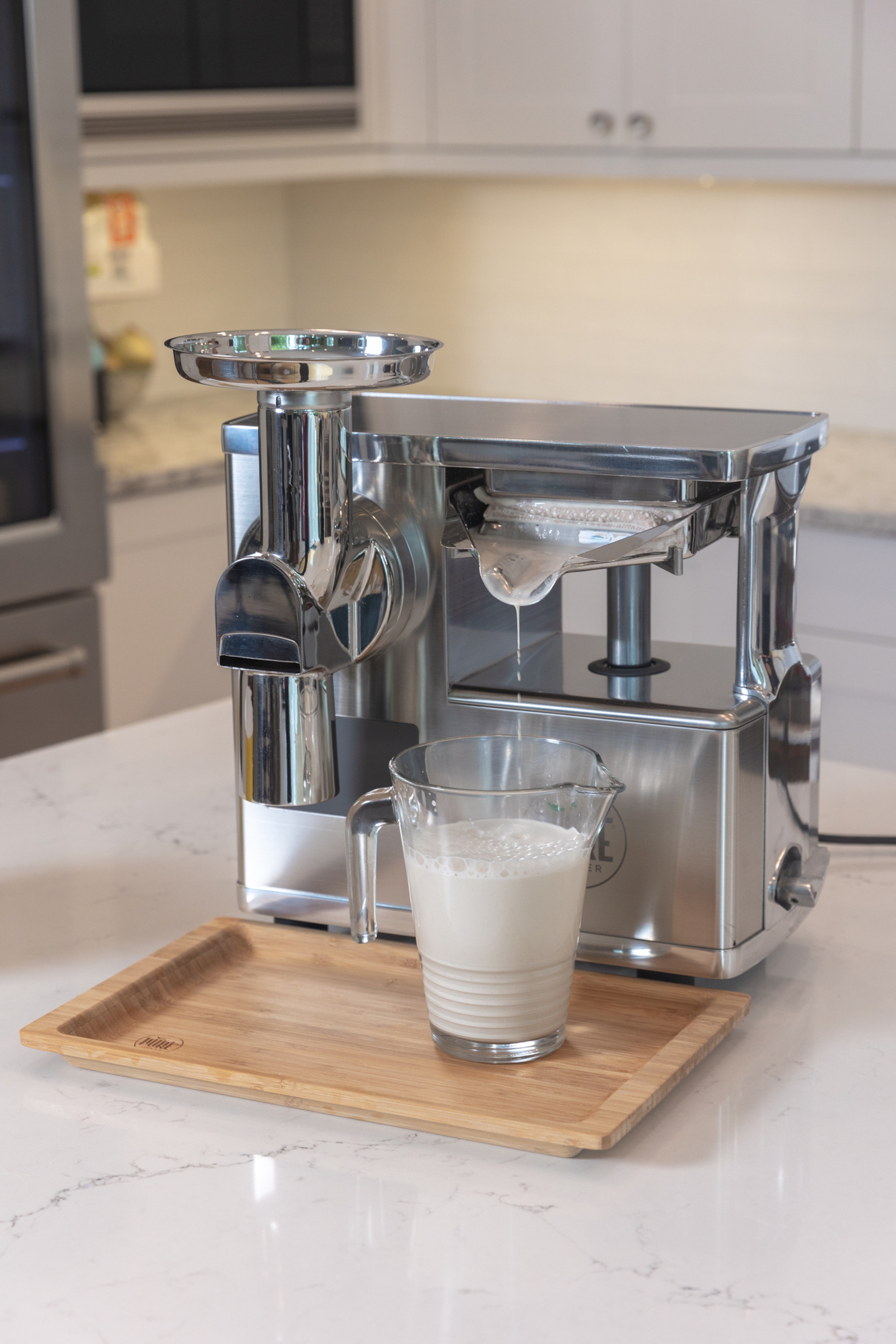
How to Make Nut Milk
The first step to making the dairy-free milk of your dreams is to soak two cups of raw nuts. Almonds are best overnight. Others, need two to four hours.
Then, replace the soaked nuts and water with fresh water and grind the nuts and water in a blender. We almost always add 2-4 dates for extra sweetness, vanilla extract, or even whole vanilla beans. We do a fine grind to get the richest flavor and yield.
Strain the mixture, so the excess milk drains through. Strain the milk one extra time; even a fine strainer isn’t as good as the PURE Juicer cloths.
Squeeze (or press!) the nut for every last drop of milk. Always remember to wrap the cloths snugly and press slowly. (In the case of cashews, we recommend that you do not use the full pressure until the very end, if at all.)
Why Grind and Press Nut Milk?
When using the PURE Juicer for homemade nut milk, you can bypass the use of a nut milk bag and instead let the machine do the straining for you (your hands will thank you!). We have heard from many of you that you get twice the milk from your recipes with this change only. Using the PURE press and a blender. Our PURE press cloths, which are designed especially for our state-of-the-art juicer, are crafted specifically to yield the highest possible nutrients while filtering pulp (or, in this case, nut meal) to produce a smooth and delicious beverage.
How Long Will Homemade Nut Milk Last?
If you are working with a quality juicer like the stainless steel PURE Juicer, your fresh nut milk should last 4-5 days in the fridge. We freeze anything we can’t drink into juice cubes for ice cream (using the PURE Juicer) or simply thawed for later use.
It’s true that store-bought nut milk will last longer, but that shelf life comes at a cost. And when you get into a rhythm of making your own plant-based milk, it takes minutes. Literally takes MINUTES to make.
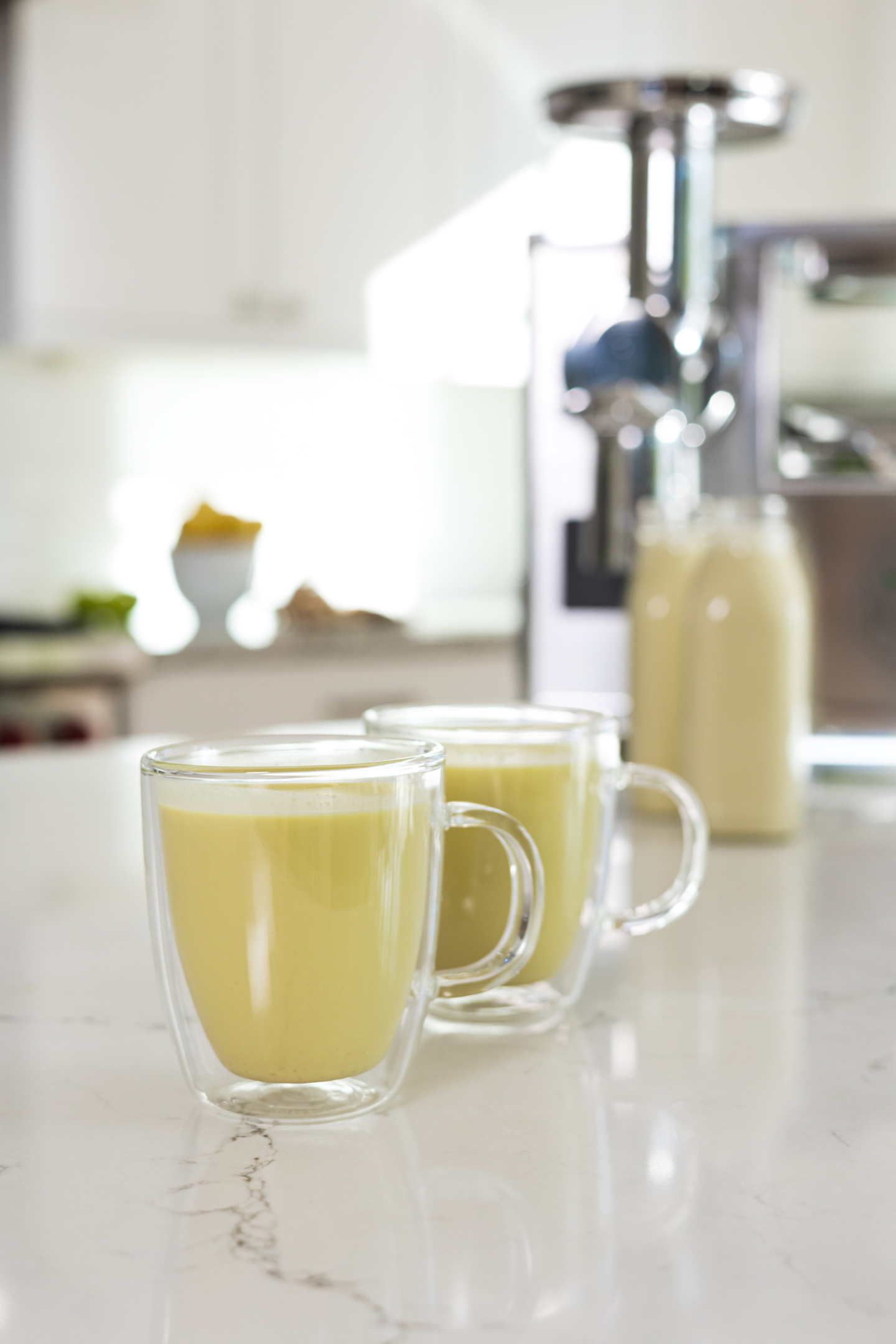
How to Make Nut Milk with Your PURE Juicer
The ingredients for a homemade nut milk recipe are simple: raw nuts and water. We love that the PURE Juicer saves time and energy when making our favorite dairy-free milk.
Soaking Your Nuts
You’ll produce about two cups of creamy nut milk for each cup of raw nuts (less for cashews and even less for oats). Since you will need to use the nut milk within a few days after making it, we suggest you soak 1-2 cups of nuts at a time.
Place the nuts in a large bowl and add three cups of water for every cup of nuts.
Soak the nuts for a minimum of 4 hours, and place the bowl in the fridge if soaking for longer than 6 hours. For the creamiest, richest nut milk, soak the nuts for as long as you can, up to 48 hours.
Draining the Nuts
When it’s time to make your nut milk, retrieve your soaking nuts. The nuts will have absorbed much of the water in the bowl. Drain any excess water that may still remain.
Next, add a 2:1 ratio of fresh water (filtered water, if you like). If you started with one cup of nuts, add two cups of water.
Grinding the Nuts
We can use the PURE grinder but because of the water/nut mix, we recommend a blender. Pour the nuts and water into your blender pitcher and turn on high speed. Blend until the nuts are completely crushed. The mixture should look white and frothy. If you grind the mixture with PURE, run it through twice using a #8 grid.
Pressing the Nuts
Freshly blended nut meal is scooped onto a PURE press cloth before folding.
When using a blender, this is the step in the process when you’d usually hand-strain the nuts using a nut milk bag–but thankfully, this time-consuming (and messy!) extra step is eliminated by using the PURE Juicer.
Instead, scoop up the ground nuts and wrap them in a PURE press cloth. Place the folded cloth on the press plate. Turn on the PURE Juicer, and press slowly. Always slow until you see the stream moving naturally to the pitcher.
You may press twice, but in this case, you may not need to. The beauty of this juicer is you can choose.
Voila! Homemade nut milk–fresh, creamy, and delicious.
Pro-tip: Don’t toss the nut meal leftover in your press cloth! Store the nut meal in your freezer and use it for baking.
A Note About Cashew Milk and Coconut Milk
While the above recipe will work for most nuts, there are a couple of nut milks that require slightly different instructions:
Cashew Milk
Cashews are creamier than other nuts, and we’ll be totally honest – they are a little hard to press! The method of making cashew milk is similar to what is listed above, but soaking the nuts is less important since cashews are quite soft on their own.
In our test kitchen, we used 2.5 cups of cashews and 2.5 cups of water and ended up with 25 ounces of cashew milk.
We recommend double-wrapping your strained pulp before pressing. And please remember to press SLOWLY. Don’t use the full pressure of the press, or you’ll have quite a mess to clean up after you’re done!
Pro Tip: the cashew pulp leftover from making cashew milk is out of this world. We added a little salt, and it tasted like nut butter. We also froze some and used it in a “nice” cream. It added depth and creaminess to our dessert, which we loved.
Pro Tip for cleaning: Use a pastry scraper to remove the remaining pulp from the press cloth.
Coconut Milk
Since coconuts aren’t actually nuts, their milk doesn’t need the same treatment. The white flesh of a coconut is so full of moisture that you don’t need to soak a coconut before juicing. Instead, you’ll want to grind it directly in a high-speed blender. Strain the juice like the other milk recipes before folding it into a press cloth and pressing out the sweet, sweet milk.
Flavoring Nut Milk
We love the creamy taste of nut milk on its own, but we really would be remiss if we didn’t share how easy it is to come up with flavor variations using fruit juices and other natural additions.
You can press strawberries, blueberries, or other fruits and simply add them to any plant-based milk. PURE pressed.
Strawberry Milk
Strawberries are an excellent source of vitamin C and manganese and also contain folate (vitamin B9) and potassium. They are very rich in antioxidants and plant compounds, which may have benefits for heart health and blood sugar control.
Simply wrap and press one cup of berries (five ounces of juice), and add it to some PURE-made nut milk.
YOU control the flavor by adding the amount of berries that give you the taste you love.
Drizzle in some honey or maple syrup for extra sweetness. This milk is great to drink on its own, or it would be delicious poured over your favorite granola!
Watch our Strawberry-Almond Milk Demo
Beet Milk
There are so many health benefits to beets – they are rich in nutrients, containing a little bit of every vitamin and mineral your body requires, such as folate and manganese. They also lower blood pressure, reduce inflammation, and improve digestive health.
If you want the benefits of beets but aren’t totally sold on the taste, try adding a little beet juice to your nut milk!
Learn how to make our heart-healthy beetroot juice
Golden Milk
Turmeric milk, otherwise known as golden milk, is a warm and cozy beverage that will not only soothe your digestive system but also tantalize your taste buds. We often use our almond milk recipe when making turmeric milk, but you can follow the recipe with any plant-based milk.
Learn how to make our delicious almond-turmeric milk
Chocolate Milk / Hot Cocoa
Do we need to convince you of this one? Add a little cocoa powder (with honey or maple syrup to taste) and voila! A beloved childhood treat.
What’s your favorite kind of homemade nut milk?
Health Benefits
almonds: a fantastic source of healthy fats, fiber, protein, magnesium, vitamin E, and antioxidants, almonds can not only assist with blood sugar control and blood pressure regulation, they can also reduce LDL cholesterol and protect your cells from oxidative damage, a major contributor to aging and disease.
beets: beets are nutrient-rich, containing a little bit of every vitamin and mineral your body requires, such as folate and manganese. They also lower blood pressure, reduce inflammation, and improve digestive health.
cashews: rich in healthy fats, fiber, and protein, cashews also contain essential minerals like copper, calcium, magnesium, iron, phosphorus, potassium, and zinc. Cashews may improve heart health, nerve and muscle function, and bone and oral health.
coconuts: coconuts contain many nutrients such as manganese (which plays a role in carbohydrate and fat metabolism, mineral absorption, and blood sugar regulation), calcium, copper, magnesium, potassium and zinc. Coconut milk has been shown to reduce inflammation, decrease ulcer size and fight viruses and bacteria.
pistachios: rich in nutrients like potassium, magnesium, and phosphorous, pistachios are also full of antioxidants, which help reduce the risk of cancer and other diseases. Pistachios also provide about 37% of the recommended daily vitamin B6 intake for adults, which aids in cognitive development and protein metabolism.
tiger nuts: also known as earth almonds or chufa, tiger nuts are the tubers of the yellow nutsedge plant. Packed with plant-based protein, insoluble fiber, and heart-healthy fats, tiger nuts have been used as food and medicine since first cultivated in ancient Egypt. They are known for their prebiotic properties and have been shown to improve heart health and blood sugar regulation.
Sources
Should You Switch to Plant-Based Milk?
6 Emerging Health Benefits of Tiger Nuts
9 Evidence-Based Health Benefits of Almonds
Health Benefits of Coconut Milk
Medical Disclaimer
PURE Juicer is a juicing company. We are not doctors or medical experts. All content and information on this blog and website is for informational and educational purposes only, does not constitute medical advice, and does not establish any patient-client relationship by using this website.
Although we strive to provide accurate general information, the information presented here is not a substitute for professional advice. You should not rely solely on this information. Always consult a professional in your area for your health questions and concerns before making any professional, legal, medical, financial, or tax-related decisions.
